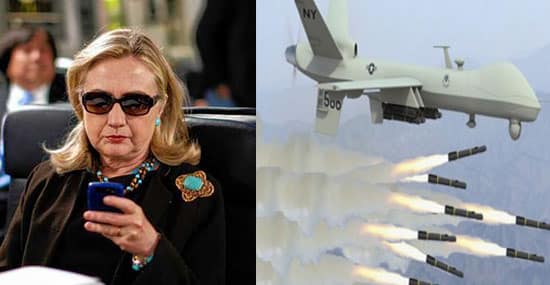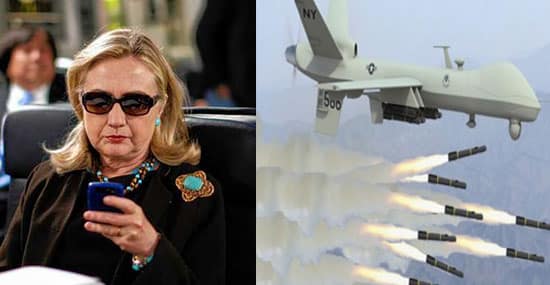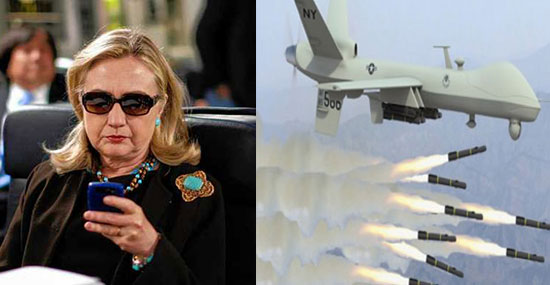A new report in the Wall Street Journal reveals emails in which then-Secretary of State Clinton approved CIA drone assassinations in Pakistan from her unsecured Blackberry.
Top Secret/SAP Messages
The timing and location of these strikes are considered Top Secret/SAP [special access program], in that revealing such data could allow the targeted humans to escape, and embarrass US ally Pakistan, whom many believe is tacitly allowing the United States to conduct such military operations inside its sovereign territory.
At specific issue are 22 emails that were on Clinton’s private server. These messages were not publicly released, withheld entirely. However, the broad contents were leaked to the Journal by anonymous congressional and law-enforcement officials briefed on the FBI’s investigation.
Clinton’s Role
Clinton’s role in approving the drone kills stems from concerns by lower State officials that the attacks’ timing and location might interfere with broader diplomatic engagement. So, from 2011 on, the State Department had a secret arrangement with the CIA, giving it a degree of say over whether or not a drone killing would take place.
Then-Ambassador to Pakistan Cameron Munter reportedly opposed certain covert operations that occurred during especially sensitive points in the U.S.-Pakistani relationship. As he later described the process “I have a yellow card. I can say ‘no.’ That ‘no’ goes back to the CIA director. Then he has to go to Hillary. If Hillary says ‘no,’ he can still do it, but he has to explain the next day in writing why.”
Clinton allegedly objected only to “one or two” attacks out of thousands.
Clinton Says None of That is True
As regards these emails, Clinton has said “the best we can determine” is that the emails in question consisted solely of a news article about drone strikes in Pakistan. “How a New York Times public article that goes around the world could be in any way viewed as classified, or the fact that it would be sent to other people off of the New York Times site, I think, is one of the difficulties that people have in understanding what this is about.”
However, the Wall Street Journal states the e-mails were not merely forwarded news articles, but consisted of informal discussions between Clinton’s senior aides about whether to oppose upcoming CIA drone strikes in Pakistan. When a potential strike was imminent, or if it occurred during a weekend or holiday when State Department staffers were away from government computers, the covert operation was then debated openly over unsecured wireless networks that anyone with a modicum of knowledge could intercept.
As a matter of speculation, the Russian and Chinese embassies in Washington DC likely employ people with a modicum of knowledge about wireless communications.
A Matter of Personal Convenience
One official said “If a strike was imminent, it was futile to use the high side [classified communications], which no one would see for seven hours.”
There is no built-in delay in classified communications. The official is likely referring to an unwillingness by Clinton’s staff to return to the office to conduct classified business on the proper system. Since there has been no suggestion or evidence that CIA officials also used unclassified systems to discuss drone strikes, one can assume they were willing to be at the office when U.S. national security issues mattered.
During Clinton’s tenure between January 2009 and February 2013, the CIA conducted 294 drone strikes that killed 2,192 people, at least 226 of whom were civilians.
Reprinted with permission from WeMeantWell.com.



